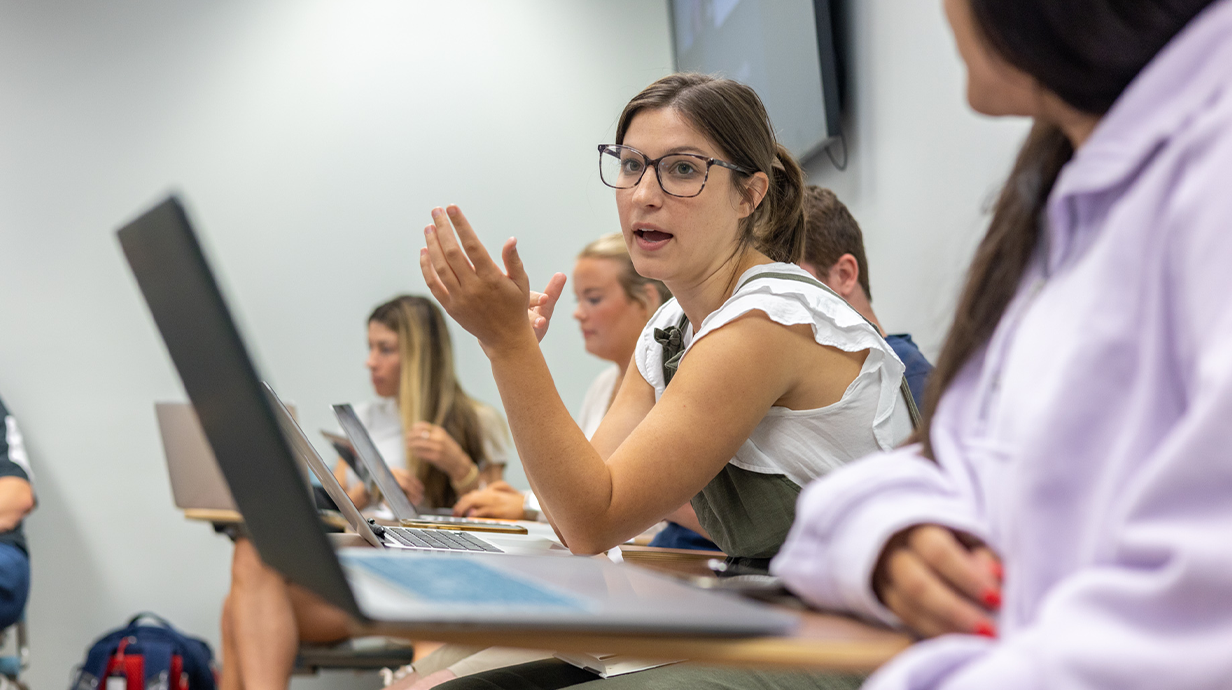Discover the courses you can take as part of the M.A. in Journalism program.
Graduate
Journalism, M.A.
Take your education a step further with a Master of Arts in Journalism designed to advance your skills and prepare you for careers in teaching, management, or research.

“College only lasts a few years. Take advantage of that time. As a French student, I can tell you there are so many more opportunities I got while studying here than I would have had in France, in terms of student life, academics and work opportunities.”
Elise-Joelle Denoulet
M.A. Journalism, ‘22
About the M.A. in Journalism
On this Page…
Program Information
Degree
M.A. in Journalism
Required Credit Hours
30
Program Type
Master's Program
Program Location
Duration
2 years

Students in Action
While enrolled in the graduate program, Taylor Tucker began working with local news station WTVA. After graduation, she landed a full-time role. You can now find Taylor on the news each morning.
“News has earned my heart, and I plan to continue my journey as a news anchor and reporter. It’s comforting to know I now have my master’s and plan to utilize it in my career.”
Taylor Tucker
Broadcast Journalist, M.A. Journalism '22
Class Offerings
You’ll analyze politics in the Southern United States and examine the role of the press in covering social issues. You’ll also study techniques used to inform the public, such as protest movements and their impact on social, political and economic change.
The theory of mass communications technology in relation to media functions, responsibilities, and influence in society.
Effects of language, culture, and ideology. Communication in the formation and action of crowds, masses, and publics. Mass and personal persuasion and propaganda techniques. The diffusion of ideas. Community power structures. Public opinion measurement.
Formulation and discussion of professional ethics for journalists. Analysis of social forces affecting media performance.
Investigative and interpretative news writing; coverage of courts and legislative bodies; use of public records.
Development of skills in conceiving, documenting, recording, and presenting information at broadcast standards as mini-documentaries in newscasts or as 30-minute and 60-minute documentary programs.
Perspectives on issues such as international mass communication, media and society, journalism ethics, diversity, etc. May be repeated for credit.
Students learn effective communications using graphical content, multimedia and interactive elements, creating a deliberate blend to add value to their storytelling. They acquire “hard” as well as “soft” skills needed in an unceasing news cycle.
Expands on principles and techniques learned in Jour 590 as students marry new production skills to evolving news sensibility, producing potentially rules-bending, “out of the box” projects as selected areas of digital media are investigated in-depth. Prerequisite: Journalism 590
Continuation of Communication Law with a concentration on specific areas of law in regard to the mass media. Prerequisite: Jour 371
Concentrated analysis and discussion of readings on media history.
Analysis of the people who report the news within the context of a time period, an ethical issue, a specific media or any other construct that provides a cohesive whole. Issues covered will range from professional problems to the human, social, and other consequences of news, news practices and news technology on the people who report the news.
In-depth, non-fiction narrative writing course for print, radio and online, consisting of features, profiles, personal essays, travel writing and sports analysis. Considers the practice of narrative journalism within the context of American journalism-literary history and within the context of daily news, giving student writers an expansive platform to explore topics of interest.
A non-thesis project must be a professional work in an appropriate medium equal in scope to a formal thesis, i.e., based on a formal proposal encompassing problem analysis, literature review, method statement, and bibliography. The project requires pre-approval of a written prospectus and an oral examination.
Meet the Graduate Program Coordinator
Meet Dr. Smith, the graduate dean who helps guide future journalists through this rich tradition and toward careers shaped by craft, voice, and vision. If you have any questions about the Master of Arts in Journalism program, she’s happy to connect and help you learn more about opportunities in the program.
Marquita Smith
Associate Dean for Academic Affairs and Associate Professor of Media and Communication
Next Steps
Explore Affordability
We have a variety of scholarships and financial aid options to help make college more affordable for you and your family.
Apply to the University of Mississippi
Are you ready to take the next step toward building your legacy?
